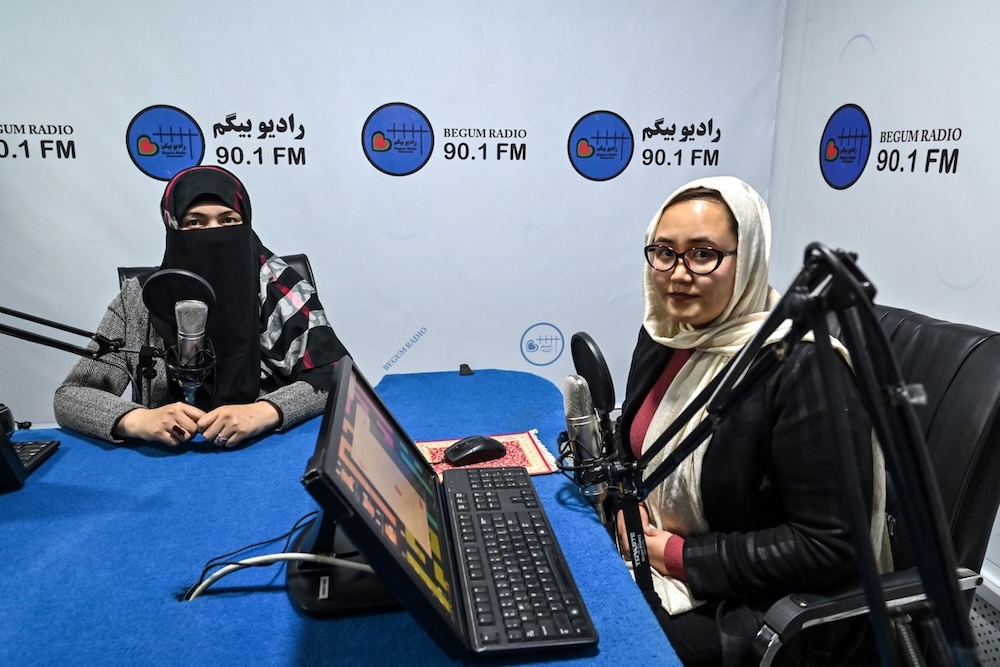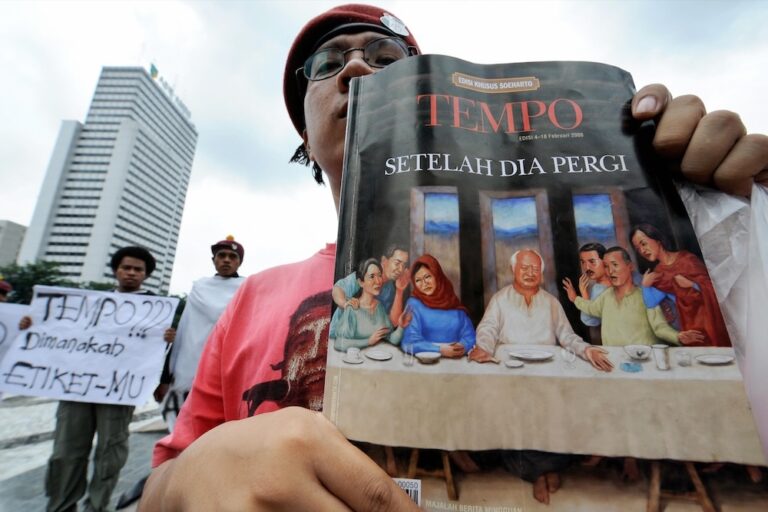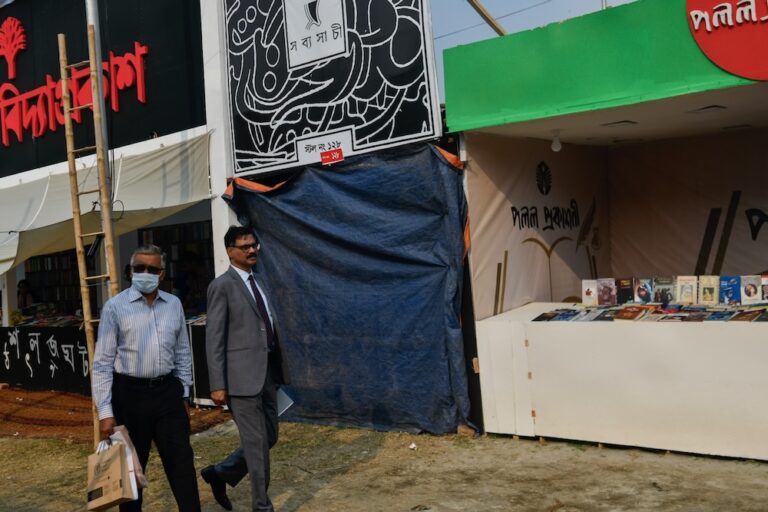Asia-Pacific: A free expression and civic space round-up produced by IFEX's regional editor Mong Palatino, based on IFEX member reports and news from the region
Bangladesh encounters challenges in rolling out reforms, media bills under scrutiny in Nepal, Afghanistan’s de facto “one-voice” policy, independent media outlets are under attack, and a digital accountability collective emerges in South Asia.
Bangladesh: Civil society groups sound alarm amid continued threats against free speech
Seven months have passed after a youth-led uprising led to the ouster of the Hasina government and the designation of an interim authority whose task was to oversee the implementation of reforms until elections are held and a new body can continue the process of democratic transition.
During this period, the interim government is faced with several challenges, which include the need to reform or repeal draconian laws, the withdrawal of charges against critics and members of the press, and ending the culture of impunity.
In the past two months, civil society groups have sounded alarm over the spate of violent attacks targeting journalists and writers. Some of the most serious cases involved the rape of a woman journalist, the arrest of writers accused of “hurting religious sentiment”, and the attack on a book fair triggered by the selling of books by an author who allegedly insulted Islam in the past.
Civil society groups also called out interim authorities for the slow pace and fragmented approach in pursuing digital governance reforms. In particular, they cited that the notorious Cyber Security Act is to be replaced by the draft Cyber Protection Ordinance but the measure “fails to address any structural issues around censorship, surveillance, consolidation of state power, and discretionary power given to law enforcement and intelligence agencies.”
They reminded authorities that the reforms are insufficient and the transition has yet to break free from the country’s history of repression and fear. They reiterated their earlier recommendation of prioritising the passage of new media laws based on an extensive and meaningful public consultation process, investigating all attacks perpetrated by both state and non-state actors, and ending the practice of filing criminal charges against individuals exercising their right to freedom of expression.
“One voice” policy in Afghanistan grows, but two radio stations resume operations
After it was suspended in February for allegedly producing content for a TV channel based abroad, Begum – Afghanistan’s only women-led radio station – is back on the air. Arezo TV also reopened in March, after an 86-day closure.
The repressive media directives imposed by Taliban authorities continue to have serous repercussions. After returning to power in 2021, the Taliban-led government has enforced at least 17 directives that restrict the work of media, prohibit the live broadcast of political and economic programs, and enable the suppression of women’s voices.
The requirement to limit interviews based on a list of interviewees approved by authorities is described as a blatant attempt to enforce a “one-voice policy” aimed at silencing the few remaining critical voices in the country. Meanwhile, at least two provinces, Helmand and Kandahar, have officially and completely implemented the ban on the broadcasting of women’s voices in media.
Over the past year, IFEX member the Afghanistan Journalists Center has documented the forced closure of 22 media outlets because of these media rules. It also monitored 172 incidents related to press freedom violations, which represented a 24 percent increase compared to the previous year. Around 50 journalists have been detained for allegedly violating the new media restrictions.
Media bills could instil self-censorship in Nepal
IFEX released a statement in March signed by other civil society groups flagging the dangers of Nepal’s Social Media Bill and Media Council Bill, noting that they “risk instilling a culture of fear and self-censorship among users.”
The proposed 11-member Media Council in the new Media Council Bill would replace the existing Press Council of Nepal with a chairperson appointed by the government. The statement expresses concerns that this provision could exacerbate government influence over independent media. Furthermore, the bill’s stated objective of making journalism “more decent, accountable and credible” could be used to target the work of critical journalists by citing vague and subjective standards.
The Social Media Bill, which mandates user registration and threatens a ban on tech platforms for non-compliance, could restrict the plurality and diversity of online voices. Authorities are encouraged to conduct more public consultations, especially since previous stakeholder intervention successfully led to the removal of draconian provisions in the Media Council Bill, such as mandatory licensing and licensing examinations for journalists and punitive fines and jail terms for posting and sharing offensive content.
IFEX members Federation of Nepali Journalists and Freedom Forum underscored that “substantial corrections” are needed to ensure that the bills promote free speech in the country.
Solidarity for embattled independent media outlets
In Mongolia, police raided the office of independent media outlet Noorog while eight staff members were interrogated overnight for allegedly undermining “national unity” over a planned documentary about the 2024 election. Reporters Without Borders (RSF) Asia-Pacific director Cédric Alviani denounced the actions of authorities. “This search, carried out under an obviously false pretext, is intolerable and a serious attack on source confidentiality and press freedom,” he said.
In Pakistan, digital media platform Raftar CEO Farhan Mallick was summoned into the office of the Federal Investigation Agency and subsequently detained for allegedly posting “anti-state” videos on YouTube, aside from being accused of sharing “fake news” content with a “public incitement agenda”. He was supposed to be released into judicial custody, but authorities said he has a new case linked to a call spoofing operation. Pakistan Press Foundation said the “arrest under such unclear and vague circumstances raises alarm bells.” Raftar vowed to resist the trumped-up charges.
“This is not just about Farhan Mallick. This is a systemic effort to throttle the voice of an integrity-driven journalist and a direct attack on every single person who dares to speak the truth in this country. We strongly condemn these attempts to silence independent journalism and will continue to fight this injustice through all legal and public avenues.”
In Indonesia, independent news company Tempo filed a police complaint after it received a severed pig’s head and six headless rats, which it described as an “act of terror”. After learning about the incident, the government expressed “regret” as it affirmed its commitment to promoting press freedom. Previously, some protesters accused the hard-hitting newspaper of serving “foreign interests”. The country’s new president has also bemoaned that “foreign-funded” media companies are trying to “divide” the nation.
IFEX member Aliansi Jurnalis Independen asserted that “every journalist has the right to work without fear or pressure in fulfilling their role as social watchdogs and holding those in power accountable.”
Tempo chief editor Setri Yasra said that the newsroom remains unfazed by the attack.
“The sender is deliberately attempting to terrorise journalists. If the purpose is intimidation, we are not afraid. Stop these cowardly actions.”
In the Philippines, local and global media watchdogs have signed a joint statement calling for the release of Eastern Vista news executive director Frenchie Mae Cumpio, who has been in detention since 2020 over “fabricated” terror charges. She concluded her court testimony in March after nearly half a decade of pre-trial proceedings. Jos Bartman, research coordinator of IFEX member Free Press Unlimited, bemoaned that the prolonged pre-trial detention is unjustifiable. “It sends a message to other journalists in the Philippines that journalists can pay a high price just by speaking truth to power,” he said in a statement.
New and noteworthy
Digital Accountability Collective South Asia (DACSA). Recognising the need for urgent action to improve the media landscape and online user experience of millions in South Asia, DACSA was formed in Colombo and initiated by groups with a distinguished record of working on the grassroots in the region, including Digitally Right (Bangladesh), Hashtag Generation (Sri Lanka), and IFEX member Digital Rights Foundation (Pakistan). An excerpt from their avowed mission:
“We aim to present a unified voice from South Asia with a nuanced understanding of the impact of platform policies and stringent state regulations on our communities. Together, we seek to create mechanisms that hold platforms and states accountable while empowering communities with skills, tools and frameworks to navigate the digital world safely and equitably.”
India: “Let the Net Work 2.0”. IFEX member SFLCin’s latest report provides a comprehensive analysis of internet shutdowns in India, which leads the world in the number of internet blocking orders imposed by authorities. But more than just tracking the extent of internet shutdowns, the report offers compelling evidence on the pervasive impact of restricting online services.
“Internet shutdowns are more than just disruptions – they hinder emergency services, weaken governance, and violate fundamental rights.”
New book from Mizzima News. Titled Resisting Myanmar Military Rule (1988-2024): Story of Mizzima Media; Born in Exile, Banned in Myanmar, the book, written by Nandita Haksar and Soe Myint, celebrates the resilience not just of IFEX member Mizzima but also of Myanmar’s independent media and their role in resisting junta rule. Mizzima founder and editor Soe Myint summed up the legacy of their work and the commitment to support the pro-democracy movement. “When we set up Mizzima in 1998 – not just for news and developments – when we set up, we wanted it to be part of the movement for federalism and democracy.”
“Bytes and Rights” video series. IFEX member Media Matters for Democracy has a new video series with ten episodes that tackles internet governance and digital freedom in Pakistan. The series also provides Pakistani internet users with engaging conversations on human rights, journalism, and tech policies.



